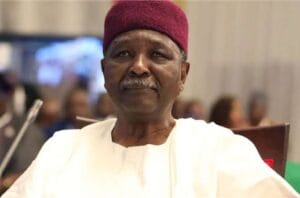Nigeria’s public debt is poised for a substantial increase as President Bola Tinubu has requested the National Assembly’s approval to secure approximately $24.14 billion in new foreign loans. This proposed borrowing, if approved, would add an estimated N38.24 trillion to the nation’s existing debt stock, potentially pushing Nigeria’s total public debt from N144.67 trillion at the end of 2024 to over N182.91 trillion by 2026.
The requested borrowing comprises $21.54 billion, €2.19 billion, and ¥15 billion. Utilizing current market exchange rates (€1 to $1.1381 and ¥1 to $0.0068), the euro component translates to roughly $2.5 billion, while the Japanese yen portion converts to approximately $102 million, bringing the total new loans to an estimated $24.14 billion. Converted at the official exchange rate of N1,583.7388 to the dollar, the naira equivalent stands at N38.24 trillion.
According to data from the Debt Management Office, Nigeria’s total public debt was N144.67 trillion as of December 31, 2024, marking a 48.58 percent rise from N97.34 trillion recorded at the end of 2023. This increase was attributed to significant growths in both domestic and external borrowings, further exacerbated by the depreciation of the naira against major foreign currencies. The exchange rate fluctuation notably inflated the local currency equivalent of the country’s external debt, which surged by 83.89 percent from N38.22 trillion ($42.5 billion) in December 2023 to N70.29 trillion ($45.78 billion) by the end of 2024. Similarly, domestic debt increased by 25.77 percent, from N59.12 trillion to N74.38 trillion within the same period.
The Federal Government accounted for N70.41 trillion of this amount, up from N53.26 trillion, while debt owed by states and the Federal Capital Territory decreased from N5.86 trillion to N3.97 trillion.
If the new borrowing receives full approval, Nigeria’s external debt would rise from $45.78 billion to approximately $69.92 billion—an additional $24.14 billion, representing a 52.7 percent surge. In naira terms, this would escalate the external debt portion of Nigeria’s total public debt to over N108 trillion. The proposed borrowing also represents a 28.68 percent increase relative to the Federal Government’s current indebtedness of N133.33 trillion as of December 2024. When compared to the total national debt of N144.67 trillion, the new loans signify a 26.43 percent increase.
In a letter to the House of Representatives, President Tinubu explained that the external borrowing plan is part of the 2025–2026 rolling borrowing programme, intended to support key sectors including infrastructure, agriculture, healthcare, education, water resources, security, and public finance reforms. He stated that the projects under the plan have undergone technical and economic appraisals and were selected for their potential to stimulate growth, generate jobs, and improve public service delivery.
In a separate request, the President sought approval for a $2 billion foreign currency-denominated bond program to be issued in Nigeria’s domestic debt market. This initiative, falling under the 2023 Presidential Executive Order on Foreign Currency Denominated Financial Instruments, aims to deepen the domestic financial market, attract local dollar investments, strengthen foreign exchange reserves, and help stabilize the exchange rate. However, this bond will also contribute to a higher debt servicing burden due to its foreign currency repayment requirement.
Additionally, President Tinubu is seeking legislative backing to issue N757.98 billion in bonds to clear outstanding pension liabilities under the Contributory Pension Scheme as of December 2023. The Presidency stated this move aligns with the Pension Reform Act 2014 and is aimed at alleviating hardship for retirees, restoring trust in the pension system, and improving morale among public servants. The Federal Executive Council had previously approved this bond issuance earlier in the year.
Combined, these three initiatives—the $24.14 billion external loan, the $2 billion bond program, and the N758 billion pension bond—could push Nigeria’s debt significantly beyond N182.91 trillion. This estimate does not account for trillions of naira in domestic debt likely to be raised over 2025 and 2026 to finance budget shortfalls, nor does it factor in scheduled debt repayments. Notably, a $1.118 billion Eurobond is maturing in November 2025. While Nigeria has fully repaid the $3.4 billion facility obtained from the International Monetary Fund under the Rapid Financing Instrument in 2020, the country remains liable for annual charges of roughly $30 million in Special Drawing Rights. These obligations are expected to further strain Nigeria’s fiscal position.
Economists Raise Concerns
Economists have expressed concerns regarding the sustainability of the proposed $24 billion external borrowing. In interview, experts underscored the importance of judicious utilization of the funds to avoid unnecessary additions to the national debt burden.
Johnson Chukwu, Group Chief Executive Officer of Cowry Assets Management Limited, voiced reservations about the Federal Government’s planned $24.14 billion foreign borrowing, emphasizing the need for transparency and efficient deployment of the funds. “The most important thing is what the money is being used for, and that’s what Nigerians will be focused on,” Chukwu stated. While acknowledging that borrowing is not inherently negative, he cautioned against government-led infrastructure spending without clear value. “If borrowed funds are invested in assets that generate value higher than the value of the loan, then it is worth it,” he said, warning that inefficient spending could turn the loan into a burden. Chukwu also noted that the proposed loans could increase Nigeria’s existing $45 billion foreign debt by 50 percent, depending on the implementation timeline. He urged the government to prioritize private sector partnerships for infrastructure projects to reduce costs and enhance efficiency.
Dr. Muda Yusuf, Chief Executive Officer of the Centre for the Promotion of Private Enterprise, echoed similar concerns regarding the Federal Government’s escalating debt commitments, particularly the heavy reliance on external borrowing. Yusuf warned that Nigeria’s rising debt service burden is already exceeding capital expenditure and could potentially hinder essential government functions if not properly managed. “Debt service is already far more than the appropriation for capital spending,” he stated, describing the trend as worrisome. He stressed the need for the government to focus on revenue growth and fiscal consolidation rather than accumulating new debts. “We need to tread very cautiously with respect to debt commitments,” he added, suggesting that while economic reforms might eventually improve revenue, new external loans require critical scrutiny for cost and purpose.
Professor Segun Ajibola, Professor of Economics at Babcock University, supported the Federal Government’s plan to issue a N758 billion bond to settle outstanding pension liabilities, calling it “long overdue.” Ajibola expressed dismay at the delay in providing entitlements to senior citizens who have served the nation, especially amidst rising inflation. “If there is anything that could be done to take care of those who have served their Fatherland and extinguish whatever is owed them, I think it’s long overdue,” he remarked. While acknowledging the government’s limited fiscal space, Ajibola cautioned against resorting to money printing by the Central Bank.
Marcel Okeke, a former Chief Economist at Zenith Bank, asserted that the borrowing plan is regressing the country. “Rather than coming out of the woods, the economy is being taken in. Each government comes and says that they are borrowing this money for infrastructure,” Okeke stated.
Political Opposition and Civil Society Criticisms
The Peoples Democratic Party (PDP) and former Vice President Atiku Abubakar have criticized President Tinubu’s loan request, labeling it “irresponsible.” They called on Nigerians and the National Assembly to reject the request and hold the President accountable.
Debo Ologunagba, PDP National Publicity Secretary, demanded a full account of all previous loans secured by the Tinubu administration. Ologunagba stated that the party would lead the push for the rejection of the new loan request. “This is what happens when those in government are self-serving rather than people-oriented. These are the consequences of having irresponsible leadership in power,” Ologunagba said. He further expressed concern about the perceived compromise of democratic institutions. “The National Assembly, comprising the Senate and House of Representatives, is meant to represent the people, ensure good governance, and serve as a check on the executive. But it’s on record that the APC leadership of the National Assembly has said they will approve whatever the President presents. That’s not how a democracy should function. I believe we’ve reached a point where Nigerians must begin to rise and demand accountability. We have lost count of how much the APC administrations, from Buhari to President Tinubu, have borrowed.”
Former Vice President Atiku Abubakar, through his media adviser, Paul Ibe, raised serious concerns over Tinubu’s request, describing the move as “troubling” and lacking transparency. Atiku questioned the rationale behind the new borrowing given Nigeria’s deteriorating economic indicators and the absence of visible results from previous debts. “They should explain to Nigerians how the loans collected so far have been used. What impact have those funds had? Because things have not improved,” he stated. He warned that without clarity and accountability, the loans risk diversion into private hands. “It’s troubling that another loan is being taken without any clear details. This money may end up in the pockets of government officials and their allies,” he added. The former Vice President also expressed disappointment at what he termed the administration’s “lack of innovation” and “over-reliance on borrowing,” cautioning that such actions would burden future generations without improving the well-being of Nigerians.
Debo Adeniran, Chairman of the Centre for Accountability and Open Leadership, argued that continued borrowing is unnecessary given the country’s sufficient resources to finance its needs. However, he noted that the borrowing might be excused if it aligns with provisions in the 2025 budget.
Auwal Musa Rafsanjani, Executive Director of the Civil Society Legislative Advocacy Centre, criticized the Federal Government’s persistent reliance on borrowing without clear accountability or tangible results. Rafsanjani expressed concern that previous loans, including the $3.4 billion IMF facility during the COVID-19 pandemic, have allegedly been misused or remain unaccounted for. “The government continues to borrow, and it cannot prove to Nigerians what they are doing with the borrowing,” he said.
Emmanuel Onwubiko, National Coordinator of the Human Rights Writers Association of Nigeria, condemned President Tinubu’s loan request as “reckless and harmful to the country’s future.” “There is no valid reason why the president wants to drag the country into these debts,” he asserted. Onwubiko also criticized the National Assembly for lacking independence, stating, “Nigerians should hold President Tinubu and the rubber-stamped National Assembly responsible for this vicious circle of dragging the country into a bottomless pit of foreign loans.”
Vahyala Kwaga, Group Head of Research and Policy Advisory at BudgIT, cautioned against the Federal Government’s plan to undertake new foreign loans, highlighting the risk of breaching Nigeria’s debt threshold. “Adding this new debt to our current total debt will push Nigeria to its self-imposed debt-to-GDP limit of 40 percent,” he said. Kwaga also raised concerns about poor transparency, noting that the most recent budget implementation report available is from the second quarter of 2024. “The federal government needs to demonstrate far more transparency and accountability in how it has spent previous debt,” he added.
Nigeria Seeks $24.14 Billion in Fresh Foreign Loans, Debt Projected to Soar
Ifetayo Adeniyi
Adeniyi Ifetayo Moses is an Entrepreneur, Award winning Celebrity journalist, Luxury and Lifestyle Reporter with Ben tv London and Publisher, Megastar Magazine. He has carved a niche for himself with over 15 years of experience in celebrity Journalism and Media PR.




